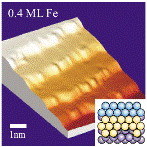Department of Physics and Astronomy: Publications and Other Research

Axel Enders Publications
Document Type
Article
Date of this Version
2006
Abstract
The thermal stability of free pure C60-, as well as C60-alkali, and -alkaline-earth metal compound clusters is investigated. We find that small (C60) m-clusters (m ≤ 6) decay at comparatively low temperatures below 400 K, as a consequence of weak intermolecular van der Waals interaction. Adding barium or potassium to the clusters dramatically increases the decay temperatures for “magic” configurations of (C60)mBa2m−1 and (C60)mK2m, which reach values as high as 1780 K. Contrary to common belief, the superstable compound clusters are not characterized by filled geometrical or electronic shells. Density functional calculations show that the delicate interplay of ionic (K, Ba) and covalent (Ba) interaction between C60 and the metal atoms, on the one hand, and entropic contributions to the Gibbs free energy, on the other hand, determine the unusual stability.


Comments
Published in THE JOURNAL OF CHEMICAL PHYSICS 125, 191102 (2006). © 2006 American Institute of Physics. Used by permission.